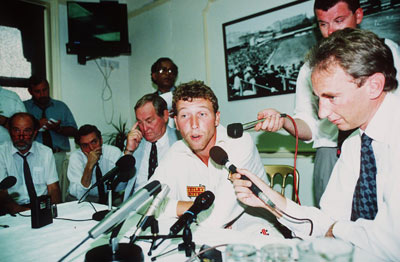
A gradual but inevitable descent into cricket-based loathing and bile.
The Commentators: The BCCI
We’ve heard some terrible ideas in our time; some of them just poor decisions (such as picking Boyd Rankin for a Test match), some of them genuinely bonkers (such as picking Darren Pattinson for a Test match) and some of them just wildly optimistic (such as asking 51allout ‘writer’ James Knight to contribute more than just a title of ‘Eoin Morgan: Dick’ before buggering off on holiday for months). But for all their faults, none of these ideas are inherently evil. The BCCI announcing plans to introduce a commentators school, however, is exactly that.
We’ve talked at length before about what actually makes a good commentator. While there’s no hard and fast rules, there are a number of ideas that crop up time and time again: being intelligent and talking to the audience as if they are too; actually adding insight rather than just telling us what we’ve just seen at high volume; having an opinion and being able to justify it and being honest, calling it as you see it. Basically, being Michael Atherton. Or, to look it from another perspective, being all things that the BCCI seem to hate.
Cricket fans in the UK have been spoiled with the quality of their commentary for some time. Even before Sky took the game and hid it away from a generation of school children behind subscription paywalls, the BBC and Channel 4 both did excellent jobs with their coverage, albeit on meagre budgets and with occasional breaks for horse racing and The Simpsons. Over the last decade Sky have moved that forwards, mainly by getting rid of the horse racing.
That’s not to say that everything on Sky is perfect – Bumble seems to lurch between annoying and insightful while Beefy is exactly the sort of person that would front an online betting company who refuse to follow through on their DVD-related promises – but, alongside TMS (which has its own problems), it’s hard to complain about the overall standard provided in the UK. While not everyone is to our tastes (Nicholas Verity Knight is another that we’ll politely describe as ‘a bit shit’), the package as a whole is generally pretty decent.

Although we are starting to get a bit tired of anecdotes about the 1997 Akai-Singer Champions Trophy now.
Which brings us to the complicated world of Indian cricket commentary. Here, the BCCI have control over the commentators and, by extension, the commentary box. This means that any topics that portray Indian cricket in a negative light, such as those pesky corruption allegations in the IPL, can be completely suppressed. Along similar lines, criticising the Indian players is another definite no-no. Even not being positive enough is viewed as a cardinal sin.
And to us, this stinks. It really stinks. For a start, if we weren’t allowed to criticise stuff, we’d never have reached two articles, let alone more than a thousand. But while slagging off people who have achieved rather more in their careers than we ever will is a fun pastime, it also gets into some more fundamental areas like freedom of speech. By not allowing commentators to talk about what they think is actually relevant for their audience, the BCCI are running little more than a propaganda machine. The foundation of a commentators’ school is simply a case of institutionalising this from a young age, using the vague promise of possible future employment (although we wouldn’t be surprised if not a single graduate ever actually made it to an IPL commentary box) as a carrot to tempt naive young men and women into towing the party line as tightly as humanly possible.
Of course, the BCCI aren’t the only ones obsessed with controlling the image of cricket in their country. We’ve watched inordinate amounts of Channel Nine coverage in our time – something that ranks alongside actually paying for Kula Shaker’s second album on our list of regrets – and we’d be hard pressed to describe them as ‘violently neutral’. However, for all their many faults (such as shouting a lot, trying to flog over-priced commemorative tat and being permanently aboard the banterbus), it is still a world away from the BCCI’s whitewashing approach towards bad news. Mostly because they still employ Ian Chappell, who notably refuses to put up with the BCCI’s bullshit. God love him.
It’s hard to prove that the BCCI’s approach to commentary is the main reason that Indian fans can be so aggressively defensive of all things around their cricket but it’s not exactly a leap of faith. A whole generation has grown up thinking that criticising Indian players or the IPL is inherently unacceptable, when criticism – just like praise – is an integral part of sport. Where would we be if we couldn’t poke fun at things? We’d have no Unlikely Lads series, for a start. But in terms of the bigger picture, we just wouldn’t be here at all. For those of us that grew up watching England in the 90s, criticism was all we ever had.



1 Comment
Post a Comment
1
Sreenath
16 May 2016 12:01
These are seriously desperate times for the fans watching cricket over the telly. Expert comments from behind the mic is being seriously missed with the likes of Danny, Ramiz, Arnold, etc ruining the experience.
Being from India, there used to be an era where I just woke up in the wee hours of the morning to just hear the likes of Richie Benaud, Bill Lawry et al during the test matches Down under.
Even the Indian panel used to be good with Sunny, Harsha, Alan wilkins.
Sadly these days it’s just shit.